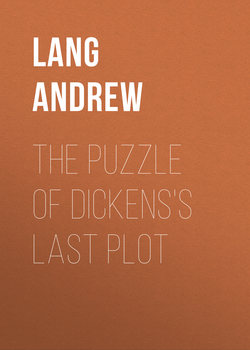Читать книгу The Puzzle of Dickens's Last Plot - Lang Andrew, May Kendall - Страница 7
THE STORY
The Unaccountable Expedition
ОглавлениеJasper now tells Sapsea, and the Dean, that he is to make “a moonlight expedition with Durdles among the tombs, vaults, towers, and ruins to-night.” The impossible Durdles has the keys necessary for this, “surely an unaccountable expedition,” Dickens keeps remarking. The moon seems to rise on this night at about 7.30 p.m. Jasper takes a big case-bottle of liquor – drugged, of course and goes to the den of Durdles. In the yard of this inspector of monuments he is bidden to beware of a mound of quicklime near the yard gate. “With a little handy stirring, quick enough to eat your bones,” says Durdles. There is some considerable distance between this “mound” of quicklime and the crypt, of which Durdles has the key, but the intervening space is quite empty of human presence, as the citizens are unwilling to meet ghosts.
In the crypt Durdles drinks a good deal of the drugged liquor. “They are to ascend the great Tower,” – and why they do that is part of the Mystery, though not an insoluble part. Before they climb, Durdles tells Jasper that he was drunk and asleep in the crypt, last Christmas Eve, and was wakened by “the ghost of one terrific shriek, followed by the ghost of the howl of a dog, a long dismal, woeful howl, such as a dog gives when a person’s dead.” Durdles has made inquiries and, as no one else heard the shriek and the howl, he calls these sounds “ghosts.”
They are obviously meant to be understood as supranormal premonitory sounds; of the nature of second sight, or rather of second hearing. Forster gives examples of Dickens’s tendency to believe in such premonitions: Dickens had himself a curious premonitory dream. He considerably overdid the premonitory business in his otherwise excellent story, The Signalman, or so it seems to a student of these things. The shriek and howl heard by Durdles are to be repeated, we see, in real life, later, on a Christmas Eve. The question is – when? More probably not on the Christmas Eve just imminent, when Edwin is to vanish, but, on the Christmas Eve following, when Jasper is to be unmasked.
All this while, and later, Jasper examines Durdles very closely, studying the effects on him of the drugged drink. When they reach the top of the tower, Jasper closely contemplates “that stillest part of it” (the landscape) “which the Cathedral overshadows; but he contemplates Durdles quite as curiously.”
There is a motive for the scrutiny in either case. Jasper examines the part of the precincts in the shadow of the Cathedral, because he wishes to assure himself that it is lonely enough for his later undescribed but easily guessed proceedings in this night of mystery. He will have much to do that could not brook witnesses, after the drugged Durdles has fallen sound asleep. We have already been assured that the whole area over which Jasper is to operate is “utterly deserted,” even when it lies in full moonlight, about 8.30 p.m. “One might fancy that the tide of life was stemmed by Mr. Jasper’s own gate-house.” The people of Cloisterham, we hear, would deny that they believe in ghosts; but they give this part of the precinct a wide berth (Chapter XII.). If the region is “utterly deserted” at nine o’clock in the evening, when it lies in the ivory moonlight, much more will it be free from human presence when it lies in shadow, between one and two o’clock after midnight. Jasper, however, from the tower top closely scrutinizes the area of his future operations. It is, probably, for this very purpose of discovering whether the coast be clear or not, that Jasper climbs the tower.
